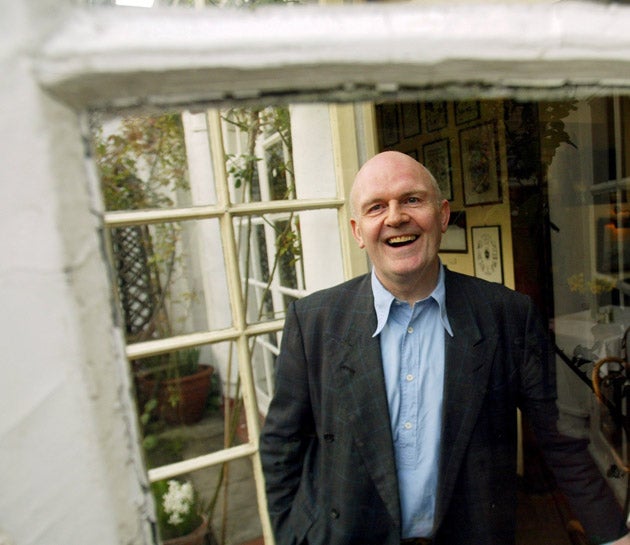
We all dread the return from a happy holiday that plunges us straight into bad news. But the worst news never arrives in a shape that we foresee. The shocking death of Gordon Burn, aged just 61, robs British literature – and journalism - of one of the most talented and original writers of his generation. Earlier this week, my colleague Deborah Orr captured his singular virtues as the creative chronicler of a media-saturated age in her obituary. I had admired Burn's writing, from the exacting moral courage of his books about the Yorkshire Ripper and West cases to the path-breaking novels that ran from Fullalove and Alma Cogan to the surreal-documentary collage of Born Yesterday, long before I met him. And meeting him felt like privileged access to an all-but-unique mind.
There was always a danger in bracketing Burn's searching and delicate scrutiny of the modern overlap between fact and fantasy, news and myth, art and celebrity, with peers such as JG Ballard and Don DeLillo. Yes, his work more than stands comparison with theirs. Yet he never purely, or mainly, belonged in the rarefied air of the avant-garde. Always a quizzical observer of cultural privilege, engrossed but never seduced by fashion and fame, the Newcastle-born writer chose to study and transform the popular frenzies of our times because they touch, and even shape, many millions of ordinary lives.
His uncompromising Modernism always tuned in to the hidden injuries – and the hidden dreams - of class. Born Yesterday, his eerie metamorphosis of the headline events of summer 2007 into "the news as a novel", not only pays pitch-perfect attention to the social undercurrents behind the media mayhem over Madeleine McCann. It also traces a moving return journey to the north-east world of the "Pitmen Painters" – the area of art where Burn's stellar career as a critic, which led to a near-legendary role as champion and friend of Hirst, Emin, Lucas et al, had begun. Those miner-artists fought hard against the democratic deficit that still bedevils British culture. Burn had waged those wars himself, which – paradoxically, perhaps – made him such a asssured rider of the frothy waves of cult and trend that swept through our art and life around the millennium.
Belligerent critics of Modernism in Britain, with Oxford professor John Carey in the vanguard, tend to caricature any major innovation in literary form and voice as a snobbish racket cooked up by an elitist minority. A figure such as Burn – a radical author from an utterly non-elite background who sought startlingly new ways of telling his stories because the shared experience of all of us demanded them - shames this brand of top-down populism. Could some four-square realist fiction in the Carey-approved style even begin to catch the collective phantoms that float through our response to the McCanns or the Wests, to Princess Diana, George Best, Michael Jackson? Burn's richly observant but spectre-haunted prose consistently could, and brilliantly did. If another British work of literature marries pin-sharp reportage with digital-era metaphysics as boldly and memorably as Born Yesterday, I have yet to discover it.
One evening last summer, we talked in the sort of glitzy Soho bar where he watched and absorbed the passing, and changing, scene like some benign visiting alien. Typically, he enthused not about his own work but someone else's – his fellow Geordie Modernist Tom Pickard, a wonderful poet under-valued for too long. Although popular and prolific, Burn too never quite received his due as a writer of the first rank. Perhaps, as the case of Max Sebald shows, writers who stretch and blend genres to keep pace with the shifts in our society and soul have to take their leave before we ever give them the welcome they deserve. In Burn's case, a uniform edition of his books – along with a fresh selection of his peerless essays – would be a start. Faber should act soon.
P.S.Whether rattled immigration minister Phil Woolas cares or not, Britain is picking up an unsavoury reputation among the world's artists and writers as the country that likes to slam the door in creative faces. Visa fiascos over recent months have kept major figures such as Iranian director Abbas Kiarostami and Lebanese novelist Elias Khoury from working or even talking on these high-walled shores. Now three poets from Indonesia and Morocco invited to the Ledbury Poetry Festival – Dorothea Rosa Herliany, Hassan Najmi and Widad Benmoussa – have fallen foul of a new control system for "tier five" temps that determines whether artists from beyond the EU may cross our borders. Can you detect any pattern to these exclusions? Perhaps there is none, but many people abroad suspect that they can. Government ought to bother about that.
Join our commenting forum
Join thought-provoking conversations, follow other Independent readers and see their replies
0Comments